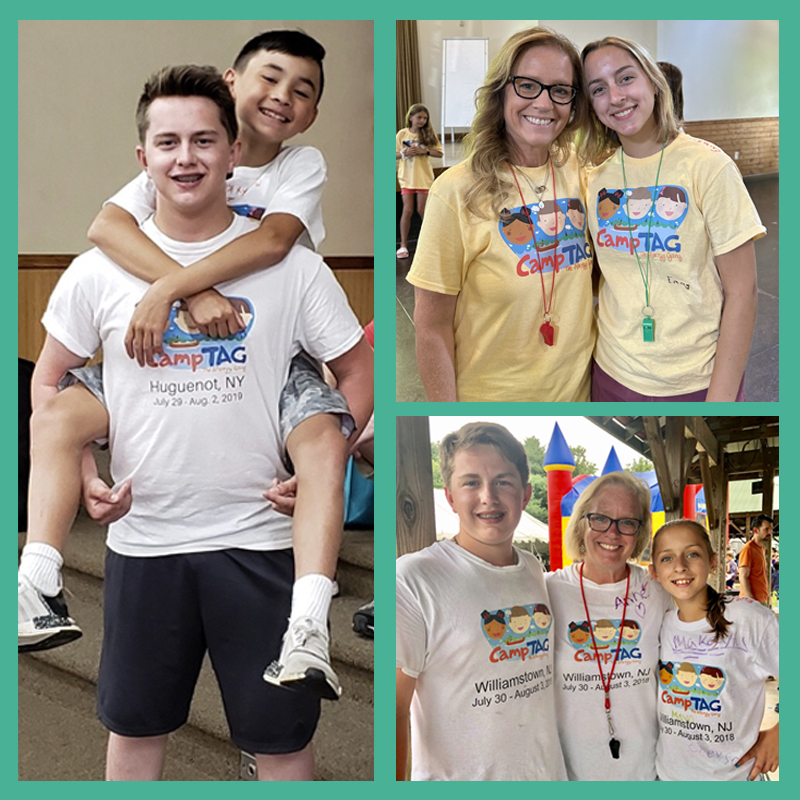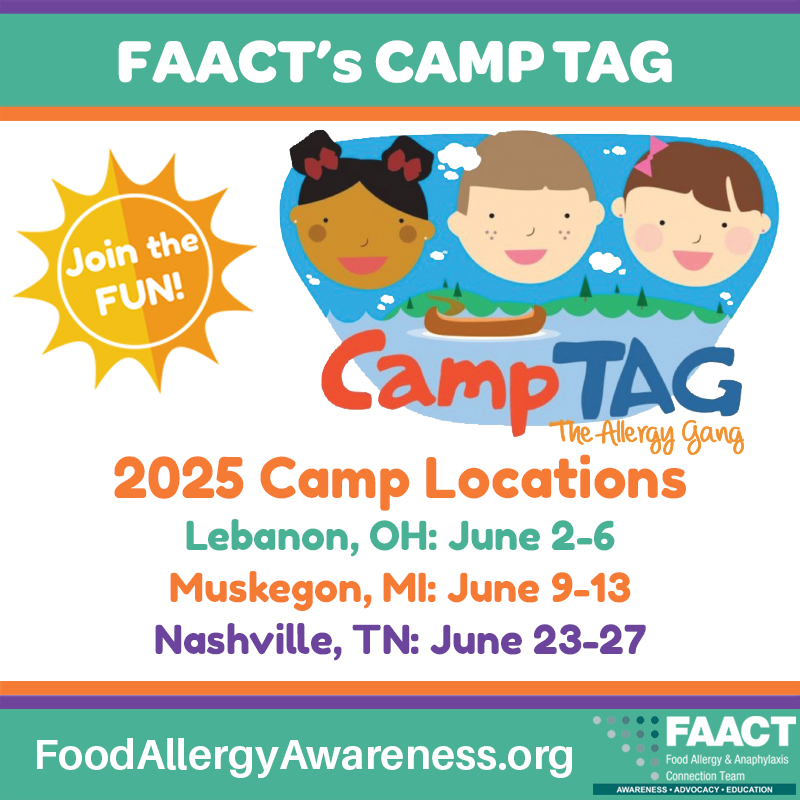Camp TAG - The Allergy Gang

Why Camp TAG (The Allergy Gang) was Created
My name is Eleanor Garrow-Holding. I am FAACT’s President and CEO as well as the founder of Camp TAG.
My son, Thomas, has life-threatening food allergies and is in remission for eosinophilic esophagitis, where his triggers were milk and wheat. He also has asthma and environmental allergies to cats, dogs, and mold. My daughter, Anne, has no allergies at all but is certainly affected by our family’s food allergy needs.
When Thomas was four years old, I started searching for summer day camps for him. I could not find a camp in our area that would accommodate his food allergies, which at the time were peanut, all tree nuts, sesame, wheat, and milk. The camps could not guarantee there would not be cross-contact with nuts, nor did they want to be responsible for the epinephrine auto-injector. So, I decided to conduct a nationwide survey to gauge interest in a specialized day camp for kids with food allergies, eosinophilic esophagitis, and asthma plus their non-allergic siblings. I wanted siblings to be able to enjoy the camp experience together.
After receiving over 3,000 survey responses (I still have that U.S. map with push pins in every city where someone responded)—all saying YES to a specialized day camp – Camp TAG (The Allergy Gang) came to fruition. TAG was named for my children: Thomas Andrew and Anne Garrow (they share the A and this life experience together). Then I decided that “The Allergy Gang” was also fitting (and easier to explain!).
As the years went by, we also include children and teens managing FPIES, Celiac disease, and mast cell diseases as part of the Camp TAG experience. Many families are managing multiple conditions, and this was a way to expand our inclusiveness while also ensuring we maintained appropriate standards to ensure everyone’s safety—while having fun!
While the children are at camp, parents and caregivers are out having their own fun. They meet up for coffee, have lunch together, go sightseeing, and more. We have group dinners in the evenings. We have a camper/teen counselor movie night while the adults socialize. It’s a fun week for the entire family where life-long friendships are made.
Thomas and Anne grew up with Camp TAG each summer and loved every minute of it. They started as campers and grew into teen counselors. Thomas was able to meet other children and in later years, teens, who lived it and got it. He became even more confident and independent managing his food allergies. Anne enjoyed making new friends and meeting other siblings like her. They both still maintain their friendships from Camp TAG and still help out each summer when they can. Camp TAG is a community – it’s family!
Thank you for allowing me to share why and how Camp TAG came to be. I hope you and your family join us for a memorable and life-changing week. You will forever be part of our Camp TAG family!

Camp TAG (The Allergy Gang)
2025 Is Camp TAG's 15th Year!
Camp TAG provides a safe place for children with food allergies, eosinophilic disorders, FPIES, Celiac disease, atopic dermatitis (eczema), asthma, and/or mast cell disorders, and their non-allergic siblings to have fun – with no worries about allergic reactions – and meet other children who share similar experiences. Camp TAG provides peer-to-peer networks, support, gaining independence and confidence, and more - everyone has the opportunity to be with others who live it and get it. It is a bonding and empowering week for all campers and counselors, including parents/caregivers.
Camp TAG is 95% fun and 5% educational, with age-appropriate activities and games each day on food allergies, anaphylaxis, nutrition, the emotional impact of living with food allergies (for children with food allergies and their families), and how to stay safe at school and at home. The curriculum was designed and reviewed by FAACT's Medical Advisory Board.
Activities each day will include camp games, ropes course, climbing tower, canoeing, arts and crafts, music, swimming, Ga-Ga, archery, mine chutes, giant swings, and field sports such as soccer, basketball, baseball, flag football, lacrosse, and so much more.
This ONE-WEEK, DAY CAMP is designed specifically for children ages 4-13. For camp activities, children are grouped by ages to ensure experiences are age-appropriate:
- Ages 4-6
- Ages 7-9
- Ages 10-11
- Ages 12-13
Camp TAG Locations:
Registration is Open!
Please see the location you are interested in for the Registration fees. Tuition payments must be made in full at time of registration.
Any questions, please email Eleanor.Garrow@FoodAllergyAwareness.org
Teen Counselor Positions Available
Teens, ages 14+, with food allergies, eosinophilic disorders, FPIES, Celiac disease, atopic dermatitis (eczema), asthma, and/or mast cell disorders or a non-allergic teen sibling, may apply to be a teen counselor. Camp TAG provides one counselor for every five children. We'd really like to see the teens apply for counselor positions because they can relate to the campers and act as mentors.
Teens receive community service hours for their time, which averages about 35-40 hours for the week. Teen counselors will be notified once applications are reviewed. Once approved, there is a $145 activity fee for teen counselors to be paid via FAACT's secured PayPal. *NOTE: The Nashville teen activity fee is the same as the camper fee due to the camp's risk policy.
Medication Policy
Medications are checked in each day in the morning and checked out each afternoon when you pick your child up from camp. We do not keep medication overnight. There are camp nurses on site at all times. The counselor of your child’s group will be carrying the child’s medications in a portable cooler on wheels (room temperature) so all medications are with your child the entire time. Every camper must have a medical/health plan completed, which is included in the registration packet.
Food Policy
Each camper is responsible for bringing his/her own lunch Monday through Thursday. To ensure the safety of campers with food allergies, some of the “top 9” allergens are prohibited at camp, including peanuts, tree nuts, fish, shellfish, and sesame. We stress the importance – and ease – of cleaning hands and not sharing foods to help build healthy habits for all campers. Campers and counselors must use WetOnes® hand wipes during check in each morning, before and after morning snack and lunch times, and any other time needed throughout the day.
* WetOnes® Ingredients:
Active Ingredient: Benzethonium Chloride (0.3%). Inactive Ingredients: Water, SD Alcohol 40, Aloe Barbadensis Leaf Juice, PEG-60 Lanolin, Quaternium-52, PEG-8 Dimethicone, Fragrance, Sodium
Caprylcamphopropionate, Disodium EDTA, Potassium Sorbate, Phenoxyethanol, Methylparaben, Ethylparaben, Propylparaben, Citric Acid.
YMCA Camp Kern, YMCA Camp Pendalouan, and YMCA Camp Widjiwagan already have a peanut- and tree nut-free policy in place, therefore, all food brought in must be free of those ingredients. Camp TAG provides bottled water for every camper each day to eliminate the need for parents to pack drinks for campers. No drinks are allowed to be brought in during the week.
Additional restrictions:
- Foods with wheat, egg, milk, and soy are allowed, such as sandwich bread, crackers, and cookies (must be free of peanuts, tree nuts, fish, shellfish, and sesame).
- Milk/cheese-based foods are not allowed, such as cheese of any kind, Cheetos, Cheez-It Crackers, Doritos, yogurt, etc., to minimize the risk of cross-contact.
- Egg-based condiments are not allowed, such as mayonnaise, dressings, dips, etc., to minimize the risk of cross-contact.
In addition, Camp TAG provides allergy-friendly snacks free of the "top 9" (plus gluten-free, vegan, non-GMO) from Red Plate Foods during the morning Education session for every camper.
Each camper will be required to clean his/her hands with hand wipes when they arrive at camp each morning and before and after snacks and lunch.
Education for Campers & Counselors
There will be an education session implemented during the education portion of the week for the campers and counselors on how to recognize signs & symptoms of anaphylaxis and how to use an epinephrine auto-injector (with trainers).











